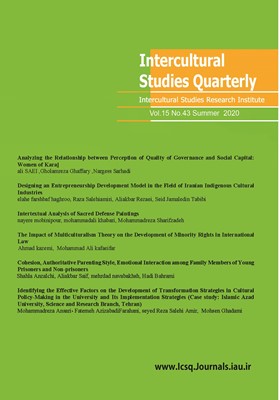Analyzing the Relationship between Perception of Quality of Governance and Social Capital: Women of Karaj
Subject Areas : INTERCULTURAL STUDIES QUARTERLYali SAEI 1 * , Gholamreza Ghaffary 2 , Nargess Sarhadi 3
1 - Associate Professor, Department of Social Planning and Welfare, Faculty of Social Sciences, University of Tehran
2 - Associate Professor, Department of Sociology, Tarbiat Modares University
3 - PhD student in gynecology, Tarbiat Modares University.
Keywords: Trust, Women, Social capital, Participation, Perception of Quality of Governance,
Abstract :
The purpose of this article is to study the relationship between perception of “quality of governance” and “social capital”. In this paper, the perception of quality of governance is considered as independent structure and social capital is considered as dependent structure. The statistical population of this study are women 18-64 years old in Karaj. The sample size is 406 persons who were selected by cluster sampling method among women living in ten districts of Karaj municipality. Linear regression method was used to judge the research hypotheses. The empirical findings show that perception of “quality of governance” has a significant relationship with women's trust. The correlation coefficient of regression is 53.4 and approximately the proportion of trust variable explained by perception of governance quality is 29%. The empirical evidence also confirms the relationship between perception of women's perception of quality of governance and community membership and participation by factor 17. A proportion of the variance of membership and association participation that explained the perception of quality of governance is 3%. The empirical findings did not confirm the significant relationship between perception of quality of governance and intra-group communication among women.
بوردیو، پیتر. شکل های سرمایه. سرمایه اجتماعی، اعتماد، دموکراسی و توسعه (مجموعه ، مقالات به کوشش کیان تاجبخش، ترجمه افشین خاکباز و حسن پویان، نشر شیرازه،. 1384، تهران).
پاتنام، رابرت. جامعه برخوردار، سرمایه اجتماعی و زندگی عمومی. سرمایه اجتماعی، اعتماد،دموکراسی و توسعه (مجموعه مقالات) به کوشش کیان تاجبخش. ترجمه افشین خاکباز و حسن پویان، نشر شیرازه، 1384 ، تهران.
پیمایش ملی ارزش ها و نگرش های ایرانیان (موج سوم) ( 1395 )، گزارش کشوری، وزارت فرهنگ و ارشاد اسلامی، پژوهشگاه فرهنگ، هنر و ارتباطات، دفتر طرح های ملی، با همکاری مرکز ملی رصد اجتماعی، زمستان.
روثستاین، بو، ( 1393 ). دامهای اجتماعی و مسئلهی اعتماد، مترجمان: لادن رهبری، محمود شارع پور، محمد فاضلی و سجاد فتاحی. انتشارات آگاه.
جعفری آذردابانلو، صغری ( 1394 ). بررسی عوامل موثر بر سرمایه اجتماعی زنان شاغل وزارت تعاون کار و رفاه اجتماعی. پایان نامه کارشناسی ارشد جامعه شناسی به راهنمایی زهرا حضرتی صومعه. دانشگاه آزاد اسلامی واحد تهران مرکزی، دانشکده علوم اجتماعی.
خواجه نوری، بیژن و مقدس، اصغر( 1387 ). جهانی شدن و سرمایه اجتماعی زنان. نشریه علوم اجتماعی . (دانشکده ادبیات و علوم انسانی مشهد). (2) 5. پاییز و زمستان 1387 . 131 - 154.
ساعی، علی، روشن، تینا، تحلیل فازی اعتماد سیاسی استادان دانشگاه، مجله مطالعات اجتماعی ایران، 7 (2)، تابستان 1392 ، 59 - 86.
ساعی، علی، روش تحقیق در علوم اجتماعی با رهیافت عقلانیت انتقادی، انتشارات سمت، چاپ ششم، تهران، تابستان 1396.
فیلد، جان.( 1386 ). سرمایه اجتماعی. ترجمه غلامرضا غفاری و حسین رمضانی. انتشارات کویر. تهران.
قجری، حسینعلی و علیخانی فرادینه، اعظم. میزان سرمایه اجتماعی زنان شهر بروجن و عوامل اجتماعی تاثیرگذار بر آن. جامعه شناسی کاربردی (مجله پژوهشی علوم انسانی دانشگاه اصفهان) ، (1)30. پیاپی 45 . بهار 1391 . 171 - 1.
کلمن، جیمز. نقش سرمایه اجتماعی در ایجاد سرمایه سرمایه انسانی. سرمایه اجتماعی، اعتماد، دموکراسی و توسعه (مجموعه مقالات به کوشش کیان تاجبخش، ترجمه افشین خاکباز و حسن پویان، نشر شیرازه،. 1384 ، تهران.
مرکز ملی رصد اجتماعی شورای اجتماعی کشور، سنجش سرمایه اجتماعی کشور، پژوهشگاه فرهنگ، هنر و ارتباطات، آبان 1394.
نتایج سرشماری سراسری نفوس و مسکن سال 1395 ، گزارش تفصیلی استان البرز، مرکز آمار، ایران.
Addis, Elisabetta. Joxhe, Majlinda (2016). Gender Gaps in Social Capital: A theoretical interpretation of the Italian evidence. Working papers (Dipartimento di scienze sociali ed economiche). SAPIENZA –UNIVERSITY OF ROME. N.2 .
Bourdieu, Pierre. (1986). Forms of Capital. Handbook of Theory and Reasearch for the Sociology of Education. New York, Greenwood
Emmerik, IJ. Hetty van. (2006) Gender differences in the creation of different types of social capital: A multilevel study. Social Networks 28 ،24–37
Kaufmann, Daniel. Kraay, Art. (2009).Governance Matters VIII: Aggregate and Individual Governance Indicators, 1999- 2008 ،Washington, DC: World Bank Institute
Lin, Nan. (2001). Social Capital, A Theory of Social Structure and Action, Cambridge University Press
Norris, Pippa and Inglehart, Ronald. (2003). Gendering Social Capital: Bowling in Women’s Leagues?, John F. Kennedy school of government, Harward University
Paxton, Pamela. (1999) Is Social Capital Declining in the United States? A Multiple Indicator Assessment, AJS (American Journal of Sociology) Volume 105 Number 1 (July): 88-128
Putnum, Robert D. , (2002). Democracies in Flux, The Evolution of Social Capital in Contemporary Society, Oxford University Press
Putnam, Robert D., (1993). Making democracy work: Civic traditions in modern Italy. Princeton, NJ: Princeton University Press
Silvey, Rachel. Elmhirst., Rebbeca. (2003). Engendering Social Capital: Women Workers and Rural–Urban Networks in Indonesia_s Crisis. World Development Vol. 31, No. 5, May, Pages 865-879.
_||_
